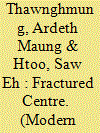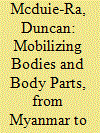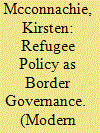|
|
|
Sort Order |
|
|
|
Items / Page
|
|
|
|
|
|
|
| Srl | Item |
| 1 |
ID:
183817


|
|
|
|
|
| Summary/Abstract |
Borderlands and bordering processes are central to politics and the governance of people, goods, and territories, not only as markers of territorial-administrative control but also as practices that shape the dynamics of inclusion and exclusion, mobility/immobility, and relations of power and authority. This special issue focuses on Myanmar, where political governance is deeply entangled with ethnicity, territory, borders, and bordering processes. We attempt to untangle these relationships by adopting an approach that combines consideration of how borderlands are governed with recognition of the ways in which borders, borderlands, and border populations shape governance and administration. We define this approach as ‘border governance’, by which we mean governance in, of, and through borderlands. In this introduction, we explore the meaning and significance of border governance as it relates to Myanmar, its ethnic border states, and their relations to other nations bordering the country. In doing so, we engage with and develop scholarly debates in three primary areas: (i) Borders, territoriality, and bordering processes; (ii) Plural governance and everyday bordering; (iii) Peacebuilding and the borders of transition. The articles in this special issue were written prior to the military coup of February 2021. Nevertheless, the central arguments presented here remain relevant, as does our conclusion: to achieve lasting peace in Myanmar, the borderlands must be at the centre.
|
|
|
|
|
|
|
|
|
|
|
|
|
|
|
|
| 2 |
ID:
183822


|
|
|
|
|
| Summary/Abstract |
Since 2011 renewed fighting between the Myanmar military and the Kachin Independence Army (KIA) has triggered the internal displacement of more than 100,000 people in Kachin state. This article examines how care practices and care ethics influence border governance in the context of humanitarian concerns in Kachin state in northern Myanmar, which shares a border with China. The situation in Kachin state at the China-Myanmar border reveals the contrasting territorial logics at stake, the contingency of governance at a time of political transition, and distinct ‘regimes of care’, as manifested through humanitarian relief, which all contribute towards border governance. Drawing on ethnographic research and interviews, the article highlights how care deficits are met by a separatist government, community organizations (both faith-based and secular), and diaspora populations which mobilize a range of networks and resources—forming webs of connections and interfacing with one another—to provide humanitarian relief. However, their actions and the ensuing flows of care could produce or deepen political subjectivities that are geared towards territorial contestation and separatism, thus changing expressions of border governance. The article further observes that the Kachin situation has wider implications for the peace negotiations taking place at the national level in Myanmar.
|
|
|
|
|
|
|
|
|
|
|
|
|
|
|
|
| 3 |
ID:
183819


|
|
|
|
|
| Summary/Abstract |
The 2015 general elections were considered a hallmark of Myanmar's transition from an authoritarian regime towards a new form of government. However, the elections did not take place in all parts of the country, and significant portions of the population were excluded from the vote, including voters in areas of contested sovereignty, those who experienced displacement by conflict, and the Rohingya. Against the background of the regulatory framework for elections in Myanmar and its electoral system, this article looks first into a particular understudied element of the electoral process—the cancellation or postponement of elections in areas affected by conflict, which is little understood by voters, election administrators, and outside observers. Second, the article examines the conditions necessary for internally displaced persons (IDPs) to participate in elections. Third, the article recapitulates the gradual legal disenfranchisement of voters and candidates who self-identified as Rohingya, which preceded their mass exodus to Bangladesh in 2017. While in 2015 all these processes of exclusion were arguably of lesser priority for the election administration, which facilitated the first credible Myanmar election in decades, they have not altered significantly since and will affect the electoral participation of disadvantaged communities again in the future.
|
|
|
|
|
|
|
|
|
|
|
|
|
|
|
|
| 4 |
ID:
183820


|
|
|
|
|
| Summary/Abstract |
While international focus has been on armed violence and Rohingya refugee flows from Rakhine state, this article pays attention to the myriad forms of ‘everyday discrimination’ that Muslim Rohingya people have experienced over a prolonged time. These forms of discrimination were observed by the author and reported by Rohingya informants in three areas of Rakhine state during research conducted in 2015. The article argues that systemic discrimination against Rohingya people can be understood as the violent enactment of bordering processes by both state and non-state actors at multiple scales, thus contributing to border governance. Bordering processes can be observed at the national level through the construction of citizenship in law and documentation; at the sub-national level through the restriction of travel and mobility at the township and village levels in Rakhine state; at the household level through household registrations and the control of births, marriages, and family relationships; as well as at the individual level through arrests, detention, and acts of violence. The border is enacted through such processes, with Rohingya people treated as an embodiment of both a political boundary between Myanmar and Bangladesh, and a social boundary constructing the Muslims as ‘fearsome and disgusting others’ by the country's non-Rohingya groups, particularly by the majority Bamar Buddhist population.
|
|
|
|
|
|
|
|
|
|
|
|
|
|
|
|
| 5 |
ID:
183818


|
|
|
|
|
| Summary/Abstract |
This article analyses the evolving nature and dynamics of the relationship between the centre and the periphery by examining how semi-democratic reforms have shaped and influenced the peace negotiation process between the government and ethnic armed organizations (EAOs) since 2011. We demonstrate that while the 2008 constitution has reduced restrictions on political, economic, and cultural activities in Myanmar, it has also inevitably produced a ‘two-headed government’ after the main opposition party, the National League for Democracy (NLD), took charge in 2016 and was forced to share power with the military. This ‘two-headed’ government is the result of the historical distrust between the NLD and the army, combined with the NLD's lack of a clear strategy in dealing with EAOs. This has enabled the army to assert its well-articulated and hardline approach—without itself having an effective strategy or the capacity to end the country's armed insurgencies or bring the peace process forward. We show that the split at the centre has produced inertia and weakened the ability of the central government to formulate and implement effective policy, and further undermined the prospects for national reconciliation. Situating this case study within the wider literature of centre–periphery relationships and democratic transition, this article offers a nuanced and comprehensive analysis of how specific institutional arrangements at the centre in semi-democratic settings affect relations in both the centre and the periphery, as well as centre–periphery relationships.
|
|
|
|
|
|
|
|
|
|
|
|
|
|
|
|
| 6 |
ID:
183821


|
|
|
|
|
| Summary/Abstract |
This article applies the concept of frontier to analytically understand the forms of border governance that are developing in a former combat zone after the signing of a ceasefire agreement between the Myanmar government and the Karen National Union (KNU). In particular, it explores border governance through the lens of judicial interventions, moral ordering, and control of crime. Based on ethnographic fieldwork in 2016–2018, it shows how a Karen-populated area changed from being a military combat zone to an area that is the target of civilian state-making efforts by both the KNU and the Myanmar state. These efforts intermingle and compete, and yet each form of state-making remains incomplete and contested. This has resulted in pluralized authorities and partly overlapping forms of what I conceptualize as ‘frontier border governance’. With its focus on two competing state-making actors, the article adds new insights to the burgeoning literature on frontiers, which predominantly focuses on a single expansionary state.
|
|
|
|
|
|
|
|
|
|
|
|
|
|
|
|
| 7 |
ID:
183824


|
|
|
|
|
| Summary/Abstract |
This article focuses on cross-border medical connections between Myanmar and Manipur, India. Non-state actors have been instrumental in creating the networks to bring bodies and body parts back and forth, first bypassing, then enmeshing, state actors. I focus on the movement of patients and medical samples across the border—from western Myanmar to Imphal city and back again—and the health infrastructure that enables it. Analysing these connections makes several contributions to the study of border governance. First, movement from Myanmar to Manipur is primarily for treatment or diagnosis, and these connections project particular ways of thinking about each place—western Myanmar as poor and remote, Manipur as advanced and networked. Second, both Manipur and western Myanmar can be considered in ‘transition’—as territories being recalibrated by political dynamics emanating elsewhere yet becoming connected through shared needs. Third, patients and samples move through territories controlled by paramilitary forces, underground groups, and different tribal councils. Routes are sometimes blocked or passage treacherous, testing the limits of conventional notions of bilateral border governance. Finally, cross-border medical connections between Manipur and Myanmar draw attention to the risky cross-border medical mobility of the poor. Rather than seeking to minimize cost, patients utilize Manipur's health infrastructure out of necessity, providing insights into the contours of cross-border medical care in times of transition.
|
|
|
|
|
|
|
|
|
|
|
|
|
|
|
|
| 8 |
ID:
183823


|
|
|
|
|
| Summary/Abstract |
Refugees have been largely overlooked in analyses of Myanmar's transition, apparently considered peripheral to more prominent topics such as negotiation with armed groups, economic reform, and political elections. By analysing approaches to return and repatriation in three distinct contexts—refugees in camps in Thailand, Rohingya refugees in Bangladesh, and Chin refugees in Malaysia and India—this article shows that proposals for the return and repatriation of refugees are a form of ‘border governance' (that is, governance in, of, and through borders). This operates at three scales: (1) global border control by keeping refugees in their region of origin or returning them to their country of origin, (2) national border control by reinforcing boundaries between Myanmar and its surrounding states, and (3) the governance of political transition by reinforcing the Myanmar government’s narrative of peacebuilding by recasting continuing conflict as conditions suitable for refugee return. Premature promotion of repatriation has a number of harmful outcomes for refugee communities: encouraging the withdrawal of international aid, escalating fear and uncertainty, and political bolstering of a Bamar-dominated government and military vis-a-vis ethnic minority groups. This analysis supports a broader understanding of repatriation and its consequences, recognising that the promotion of refugee return can have significant political implications that are apparent even before mass returns have been carried out and which may reverberate far into the future.
|
|
|
|
|
|
|
|
|
|
|
|
|
|
|
|
|
|
|
|
|